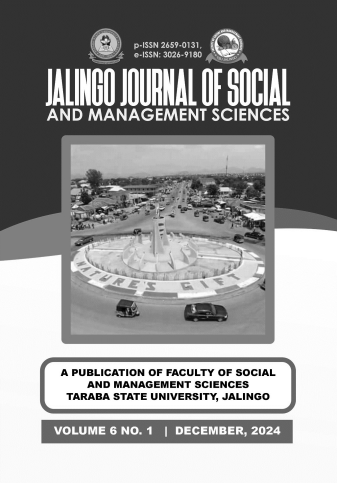Overcoming Boko Haram Insurgency in the North East, Nigeria: The challenges of Operation Safe Corridor (OPSC) in Yobe State
Keywords:
Boko Haram, insurgency, rehabilitation, peace-building, operation safe corridorAbstract
This study investigated the challenges of overcoming Boko Haram insurgency in the North-East through the activities of Operation Safe Corridor (OPSC), with particular reference to the Gujba Local Government Area (LGA) of Yobe State. Insurgency is scholarly termed irregular warfare, usually protracted and devastating. The North-East has been in crisis since 2009 due to the Boko Haram insurgency, which has continued till date despite efforts of the Federal Government of Nigeria (FGN) and Multi-National Joint Task Force (MNJTF). The insurgents have killed thousands of people; the UNDP estimated about 350,000 deaths. Despite the application of force against the group, the conflict is not over. Considering failure of the kinetic approach in addressing the Boko Haram insurgency; scholars believed that the FGN should adopt a combination of strategies for peacebuilding and peacemaking. For this reason, the FGN initiated Operation Safe Corridor (OPSC) as part of a non-kinetic approach to end the insurgency. It was established in 2016 in order to de-radicalize, rehabilitate and reintegrate the repentant Boko Haram insurgents into the society. A qualitative method guided the collection and analysis of the data through Focus
Group Discussion and Key Informant Interview. The study discovered that the application of non kinetic approach through OPSC has to some extent facilitated the addressing Boko Haram crisis in the North-East sub-region. This is due to the fact that a number of Boko Haram insurgents have repented and accepted this peace initiative of the FGN. On the other hand, some community members affected by the Boko haram insurgency have expressed fears and unhappy about the amnesty and the reintegration process due to the atrocity committed by the group. Therefore, the study recommends the need to adopt holistic approach in addressing the crisis through good governance, justice, transparency, accountability, intelligence gathering as well as consulting/convincing the community members about the de-radicalization and reintegration process.

Downloads
Published
Issue
Section
License
Copyright (c) 2024 JALINGO JOURNAL OF SOCIAL AND MANAGEMENT SCIENCES

This work is licensed under a Creative Commons Attribution-NonCommercial 4.0 International License.
